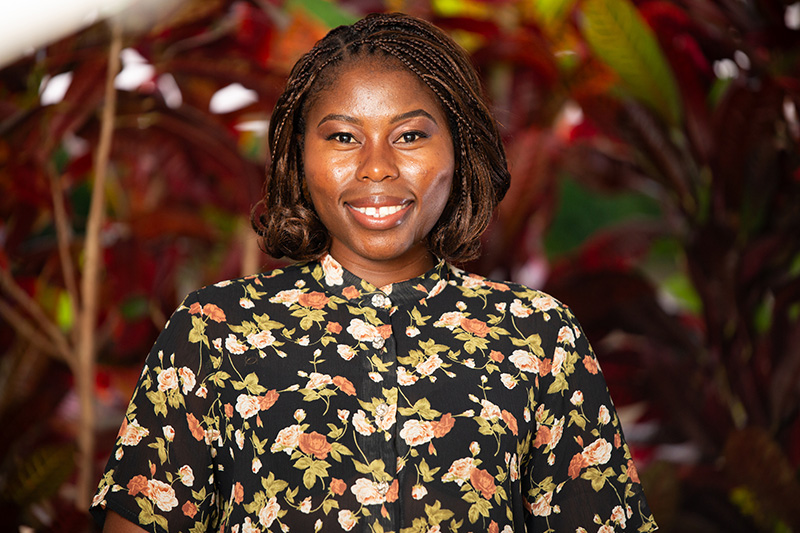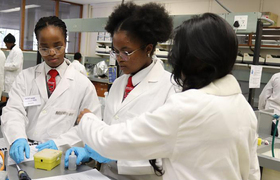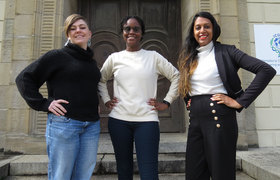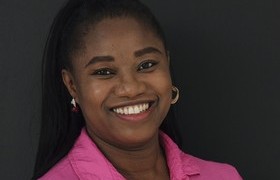Five UCT women selected for prestigious fellowship
06 August 2025 | Story Merlyn Nomusa Nkomo. Photos Mawazo Institute. Read time 6 min.
Five University of Cape Town (UCT) PhD scholars have been selected for the Mawazo Fellowship – a 15-month non-residential fellowship for African women undertaking PhD research on the continent. The fellowship builds a network of African women experts, poised to influence policy and public discourse to apply evidence-based solutions that drive Africa’s development.
The fellowship is offered by the Mawazo Institute, an African women-led organisation in Nairobi, Kenya. Mawazo supports early-career researchers whose work innovates solutions to pressing local and global development challenges. In KiSwahili, the word Mawazo means “ideas” and the Mawazo Institute believes women have ideas that can move the African continent and the world forward.
In its six years of existence, the Mawazo Institute has run three cohorts, and this year, 60 women from 28 countries around Africa were selected. The Mawazo Fellows are drawn from 10 research themes that tackle the most pressing challenges to development in Africa. These themes are: Agriculture and Food Security; Business, Trade and Economy; Climate Change, Natural Resources and the Environment; Educational Pedagogy; Energy and Engineering; Gender, Rights and Governance; Indigenous Knowledge Systems; Information and Technology; Health and Life Sciences; and Mathematical and Physical Sciences.
The UCT fellows are Adijat Ozohu Jimoh, Dr Imen Ayouni, Navitha Singh Sewpersadh and Sarah Mulaji.
More about their research
Navitha Singh Sewpersadh – Business, Trade and the Economy

Singh is an associate professor at UCT’s College of Accounting and is pursuing her PhD in auditing with the University of South Africa (UNISA). Her work seeks to develop data-driven frameworks for fraud signalling in external audits. Her work addresses a critical gap in the world of finance in South Africa and explores how auditors identify and respond to fraud risk signals. She seeks to strengthen fraud detection practices, enhance financial integrity and create more transparent audit systems grounded in theory-based frameworks.
Sarah Mulaji – Information Technology

Mulaji is a PhD fellow from the Democratic Republic of Congo. She is a student and teaching assistant in the Department of Information Systems. Her research seeks to address the complexities of digital transformation in public management. Mulaji’s work specifically focuses on the case of the implementation of the national digital identity system in South Africa. While Africa needs digitisation, the process can have unintended consequences due to the digital divide in low-income countries and communities. Her research provides insights into the challenges of digital ID projects and seeks to inform corrective actions so that intended societal benefits are realised.
Merlyn Nomusa Nkomo – Climate Change, Natural Resources and the Environment

Nkomo is a PhD fellow from Zimbabwe, studying in the Department of Biological Sciences. Her work addresses the environmental trade-offs in the development of renewable energy – particularly wind farms in South Africa. Her research focuses on the ecology of a regionally endemic raptor, the Jackal Buzzard, that is affected by wind turbine collisions the most. Her work aims to fill these knowledge gaps and improve Environmental Impact Assessments (EIAs) for renewable energy projects. She aims to contribute to sustainable development of Africa’s renewable energy sector and secure a future where biodiversity and green energy development can coexist.
Dr Imen Ayouni – Health and Life Sciences

Dr Ayouni, from Tunisia, is a PhD fellow in health sciences studying at the Department of Paediatrics and Child Health, and the Vaccines for Africa Initiative (VACFA). Her research investigates maternal vaccine decision-making in South Africa, focusing on how knowledge and attitudes toward vaccines influence vaccine uptake among pregnant women. Vaccination rates among pregnant women in Africa remain sub-optimal despite the proven benefits for mother and child. Ayouni’s work seeks to explore the factors affecting vaccine acceptance in maternal and childhood vaccines and provide critical insights for immunisation programmes and aid policy makers with evidence-based designs for effective strategies in low- and middle-income countries.
Adijat Ozohu Jimoh – Health and Life Sciences

Jimoh is a PhD fellow from Nigeria studying at the Division of Immunology. Her research seeks to understand the interactions of vaginal viral and bacterial communities in pregnant women living with HIV and women affected by bacterial vaginosis. Pregnant women living with these conditions are faced with poor outcomes in childbirth and increased vulnerability to sexually transmitted infections. Her work will uncover vaginal bacterial and viral interactions and serve as a foundation for further studies in developing safer therapeutics to improve the reproductive health and maternal outcomes of South African women.
More about the programme
Mawazo Fellows participate in 15 months of leadership and personal development training courses through the Mawazo Learning Exchange platform. The fellows are also paired with mentors who are seasoned researchers in their discipline, and offered professional, financial and social welfare support as they conclude their research and start their careers beyond the PhD.
The Mawazo Institute is committed to supporting African women in research through the complexities of womanhood, such as motherhood, marriage, disability, social expectations and living through and conducting research in conflict regions among other challenges women face. The institute envisions a world where the voices and big ideas of African women researchers shape the future of the continent and the world.
 This work is licensed under a Creative Commons Attribution-NoDerivatives 4.0 International License.
This work is licensed under a Creative Commons Attribution-NoDerivatives 4.0 International License.
Please view the republishing articles page for more information.










